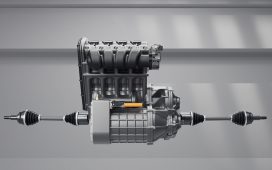PRESQUE ISLE, Maine — Electric vehicles may be catching on, but power costs and sparse chargers are keeping them out of most Aroostook County garages.
Electric vehicles have grown in popularity because they use no gasoline, emit few emissions and get better mileage than gas- or diesel-powered cars.
Electric vehicle use statewide has more than doubled since 2020, with 8,594 of them registered in Maine as of October. Of those, only about 1 percent, or 99 vehicles, belong to Aroostook County owners. Gas prices topping $5 per gallon this summer drove many to consider alternatives, but for Mainers already grappling with inflation and heating costs, new utility hikes will spike the cost to run an electric vehicle.
But a big part of Aroostook’s problem with electric vehicles is its meager supply of public charging stations and its lack of fast chargers.
While Maine has 389 in total, across The County’s wide expanse, larger than Connecticut and Rhode Island combined, there are only 10 charging stations and 17 individual plug-ins, according to Efficiency Maine.
Fort Kent has four, Caribou one, Presque Isle four, Houlton six and Danforth two. None of them are the new fast chargers.
“No one is going to plug their vehicle in for 12 hours and wait around at Riverside [Park] the whole day,” Presque Isle City Manager Martin Puckett said. “The preference has been these quick chargers, so that’s what’s needed in the area to make a real big difference.”
Presque Isle’s charger at Riverside Park was a gift from a southern Maine donor. It’s a level 2 charger, which can take from 8 to 12 hours to charge on 220 volts. So far, it’s seen little use.
The city foots the electric bill for the unit, which operates on the same circuit that supplies power for park events. One month last year records showed $60 in use from the charger; otherwise, costs have been negligible, Puckett said.
Customers pay $10 a day to charge electric vehicles at the Fort Kent town office. Staff at the Fort Kent Police Department, which oversees the two ports, said they aren’t used much. A couple of visitors over the summer charged vehicles there, they said.
There are three levels of chargers, according to Efficiency Maine. Level 1 units cost around $200, use a standard home outlet and take 20 hours or more to charge a car. Level 2 will take at least 7 hours to charge and cost from $500 to $10,000 with installation. The newest level 3 chargers will do the job in about 30 minutes, but need a 480-volt connection and can cost up to $100,000 installed.
That’s what Puckett wants to see on Presque Isle’s Main Street, where people could shop or visit restaurants while their cars are plugged in. The price tag is a deterrent.
“The cost is prohibitive. The ongoing electrical costs are $15,000 annually from just installing it — that’s an annual fee,” Puckett said. “So we’ve been very hesitant.”
Many Mainers saw another utility increase on Jan. 1. For Mainers in Versant Power’s Maine Public District, which covers most of Aroostook County, higher supply prices drove combined power and delivery to 24.88 cents per kilowatt hour. A year ago, the rate was 21 cents per kwh.
Mainers drive 14,200 miles per year, or around 1,183 miles per month, according to Federal Highway Administration data. Electric cars can travel around 3-4 miles per kwh, which means an average of 394 kwh a month.
That would add roughly $97 a month to a northern Maine electric bill. Last year, the same power would have cost $67.
But there is help for prospective electric vehicle owners. Versant said it would create money-saving rates later this year for electric vehicles. Efficiency Maine offers rebates from $1,000 to $7,500 for battery electric vehicles and from $500 to $3,000 for plug-in hybrid electric vehicles.
Maine expects to receive $19 million from the federal bipartisan infrastructure bill over the next five years, plus $8 million from the state, to beef up its charging network, said Anthony Ronzio, deputy director of the Governor’s Office on Policy Innovation and the Future.
The funds will create electric vehicle corridors, including one reaching up into Houlton and another across central Maine, Ronzio said. Details are in last month’s Maine Won’t Wait Climate Plan progress report.
Efficiency Maine plans to install new fast chargers at eight sites in rural Aroostook and Washington counties by late 2023 or early 2024.
“The state has plans to award funding for five to six new DC fast charging sites in Aroostook County: Presque Isle, Fort Kent, Ashland, Houlton, Van Buren or Madawaska, and another potential location somewhere on I-95 between Bangor and Houlton,” said Amalia Siegel, program manager for electric vehicle initiatives at Efficiency Maine.
Cameron Clark of Houlton, owner and president of Cam’s Lawn Care and Landscaping, solved his own power issues for his Tesla. He had built a solar array for his business and installed a charging plug, which he makes available free to other Tesla owners.
“The cost is minimal and I did not see any spike in cost like those that charge on the grid,” he said.
Clark has had his electric vehicle for two years, and when traveling uses the brand’s supercharger network, which is more cost-effective than regular chargers, he said. One or two people a week stop by and use his charger.
More electric vehicles are traveling to Aroostook, and that will hopefully inspire residents to drive them, too, Clark said. Having more level 2 and 3 chargers available will make owning them more practical.
“Once the charging stations are here, I’m confident more EVs will be driven,” he said.











